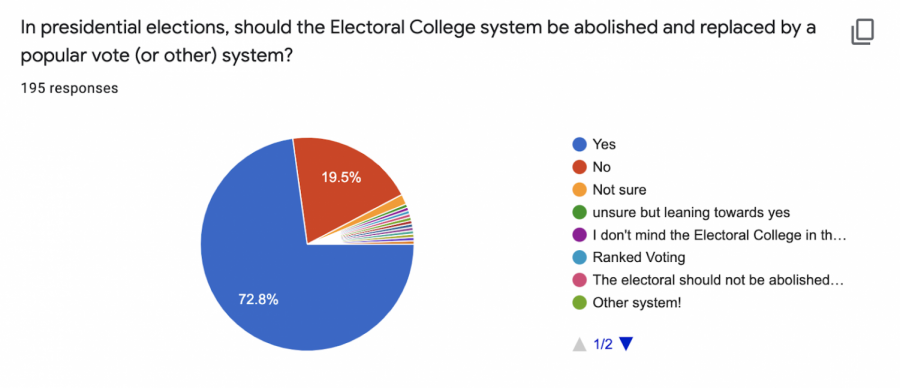How Do Latin Students Feel About Abolishing The Electoral College?
Many people don’t understand what the Electoral College is or what it means. This confusion makes the election process even more difficult, especially for young people who have not lived through many elections.
The Electoral College is a representative group that casts votes for a presidential candidate based on the number of electoral votes received. Each state has as many votes as it has Congresspeople, and in almost all cases, the candidate who wins the popular vote in a state gets all its electoral votes. (The candidate who receives the most overall votes across the entire country may have bragging rights, but winning the popular vote nationwide, as we were reminded in 2016, is not a factor in determining the outcome of the Presidential election.)
Every four years, the debate intensifies over whether to maintain the current system of voting. In a poll of 195 Latin students, 72.8% said “yes” to abolishing the Electoral College, and 19.5% said “no,” while the remaining 7.7% reported “other, or unsure.”
Most Latin students share the opinion that the Electoral College is flawed. “I think it’s a bit of a complicated subject for many reasons,” said senior Malia Brandt. “I would rather see a system that is more representative of the opinion of the country, such as one that breaks up electoral votes in each state proportionally to the popular vote in each state.”
Another senior, Olivia Katz, feels similarly. “I’m not for the Electoral College,” she said. “It makes no sense that a candidate can win three million more votes than another and still lose the presidency. Three million more people wanted Hillary to be president than Trump (in 2016), and yet Trump’s Electoral College victory won him the presidency.”
Junior Jay Doherty noted that the Electoral College had good potential when the nation was founded. “I think the purpose of the Electoral College was well intentioned,” he said, “because after the winner-take-all system began, the Electoral College aimed to ensure the most informed decision about candidates during a time where 24/7 news and social media didn’t exist.”
But times have changed. “Today, I think the argument for abolishing the Electoral College is stronger than ever, particularly because of party dominance in states,” Jay said. “In very Democrat-heavy states like Illinois, Republicans don’t always feel motivated to vote, and in very Republican-heavy states like Wyoming, Democrats don’t feel the need to vote.”
Although the majority of the student body responded in favor of abolishing the Electoral College, junior Jacob Pohl holds a minority view. “The system was intentionally designed to not be a straight democracy, but rather a republic,” he said. “The Electoral College is a compromise between larger states and smaller states to ensure that larger states do not have outstanding power over time. We are a nation of 50 states, not one.”
The remaining 7.7% of student’s answers in the survey were scattered. A few anonymous replies are listed below:
“The only time people care about the Electoral College is when it isn’t working in their favor. People do not discuss it for four years, then, come election time, it’s what’s wrong with American democracy.”
“I am not sure, but ranked voting should be implemented.”
“Either popular vote or proportional electorates per state population”
“The Electoral College should still be in place, but I think it should be proportional representation. This means that a state can divide their electoral votes, and give some percentage of their votes to a candidate based on what percent of citizens voted for the candidate (for example if a state has 10 votes and a candidate wins 40% of votes in the popular vote, they will get four of that state’s votes).”
“Different system, definitely getting rid of the winner-take-all rules because they invalidate the votes of almost half of the U.S.”
According to Pew Research Center, in 2020, about 60% of Americans say they support amending the Constitution so the candidate who receives the popular vote wins the presidency. The other 40% say they prefer to maintain the Electoral College system. It’s possible that the nation could replace its current system of presidential voting without requiring a Constitutional amendment if state electors agreed to cast votes proportionally (or by district, as Maine and Nebraska do today). The question is: Will Joe Biden and Kamala Harris listen to the people and attempt to change the Electoral College system during their upcoming term?

Emilia Rose (‘22) is excited to serve her first term as a features editor this year! Since freshman year, Emilia has driven her focus on The Forum into...















































Susan Anthony • Nov 16, 2020 at 4:58 pm
“Awarding electoral votes by a proportional or congressional district [used by Maine and Nebraska] method fails to promote majority rule, greater competitiveness or voter equality. Pursued at a state level, both reforms dramatically increase incentives for partisan machinations. If done nationally, a congressional district system has a sharp partisan tilt toward the Republican Party, while the whole number proportional system sharply increases the odds of no candidate getting the majority of electoral votes needed, leading to the selection of the president by the U.S. House of Representatives.
For states seeking to exercise their responsibility under the U.S. Constitution to choose a method of allocating electoral votes that best serves their state’s interest and that of the national interest, both alternatives fall far short of the National Popular Vote plan . . .”
–FairVote